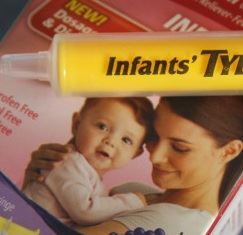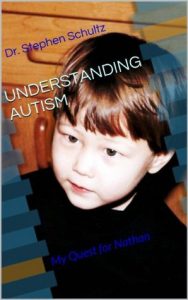 A recent review of acetaminophen (paracetamol) – sold under brand names Tylenol and Panadol – raises the alarm about giving the drug to infants and children. The review’s authors cite acetaminophen’s links with autism spectrum disorder (ASD).
A recent review of acetaminophen (paracetamol) – sold under brand names Tylenol and Panadol – raises the alarm about giving the drug to infants and children. The review’s authors cite acetaminophen’s links with autism spectrum disorder (ASD).“Our study shows that acetaminophen would never be approved for pediatric use by today’s regulatory standards,” said Dr. William Parker of WPLab, Inc. Dr. Parker led a research team that produced the acetaminophen autism review.
Published in the July 2022 issue of Minerva Pediatrics, the Dr. Parker-led review offers 17 lines of evidence that acetaminophen may contribute to the autism epidemic. (emphasis ours)
Related: Tylenol-Autism Lawsuit
The authors said their findings could help prevent ASD, as acetaminophen is often used on young children. Up to 90% of young kids in some places are given acetaminophen.
Children’s Health Defense (CHD) reports the autism spectrum disorder rate has skyrocketed in the last 40 years. WebMd reports that ASD now affects 1 in 40 U.S. children.
Acetaminophen was often used to replace aspirin in the early 1980s for childhood fevers and pain, after aspirin was shown to be linked with Reye’s syndrome.
In addition, CHD reports that acetaminophen for infants and children has never been proven safe for neurodevelopment.
Acetaminophen Safety Profile based on False Presumption?
Dr. Parker also questions acetaminophen’s alleged safety profile: “The belief that acetaminophen is safe for children is an assumption based on the fact many studies show it does not cause liver damage in children when used at an appropriate dose.”
However, Dr. Parker and his colleagues previously conducted a systematic review that was published in the European Journal of Pediatrics in February 2022. That review showed the research that claimed acetaminophen is safe for children didn’t examine acetaminophen’s effect on neurodevelopment. That omission is puzzling because the brain is a primary target for acetaminophen’s alleged therapeutic effect.
The latest review builds on earlier work from the same researchers that showed acetaminophen was not examined for neurodevelopment effects. It also builds on prior evidence that prenatal exposure to acetaminophen raises neurodevelopmental risks.
The study authors wrote: “[C]ircumstantial evidence regarding postnatal exposure to the drug is abundant, and includes at least three otherwise unexplained temporal relationships, data from laboratory animal studies, several miscellaneous and otherwise unexplained correlations, and a lack of alternative suspects that fit the evidence-derived profile.”
Conclusions
Based on this evidence, the authors “concluded without any reasonable doubt” that postnatal exposure to acetaminophen for children at risk is “responsible for many if not most cases of ASD.”
The risk factor of oxidative stress
According to Dr. Parker and his colleagues, the key to understanding the role of acetaminophen in ASD is that acetaminophen alone does not trigger ASD. The negative impact happens in the presence of oxidative stress.
Oxidative stress is an imbalance of free radicals and antioxidants in the body that can lead to cell and tissue damage.
The body’s cells produce free radicals during metabolism, chemical reactions that produce energy in cells. These free radicals can damage cells and contribute to chronic illnesses and faster aging.
Unlike many drugs, some of the acetaminophen a person takes is converted by the body into a highly toxic metabolite, N-acetyl-p-benzoquinone imine (NAPQI).
Glutathione usually renders NAPQI harmless, and since most healthy kids have plenty of glutathione, NAPQI doesn’t harm them.
Oxidative stress, however, causes glutathione depletion so the body can’t rightly purge the NAPQI. The unremoved NAPQI then reacts with many proteins which causes permanent damage to the proteins and associated cells.
Excessive oxidative stress affects babies and children by several environmental and genetic routes that include infection, antibiotic treatment(s), vaccination, psychological stress, jaundice, heavy metals vitamin B metabolism issues, EMF exposure, cigarette smoke or air pollution or organophosphates in pesticides.
A child’s chances of being injured by acetaminophen depends partly on the levels of oxidative stress upon ingestion and the quantity of the ingested drug.
When a child develops a fever after receiving a vaccine, it’s an indication the child is experiencing oxidative stress. Giving acetaminophen to a child battling oxidative stress increases the ASD risk, according to Dr. Parker.
Dr. Stephen Schultz and the first indication of an acetaminophen ASD link
 The first indication that acetaminophen might have a negative impact on neurodevelopment came from a doctor who watched his child develop health problems. Dr. Stephen Schultz saw his child regress into ASD in 1996, after routine childhood vaccination was followed up with acetaminophen.
The first indication that acetaminophen might have a negative impact on neurodevelopment came from a doctor who watched his child develop health problems. Dr. Stephen Schultz saw his child regress into ASD in 1996, after routine childhood vaccination was followed up with acetaminophen.
Dr. Shultz left his dentistry practice after witnessing his son’s “slow slide” into autism. He then went on an odyssey to discover what happened to his child. He earned a Ph.D. in the process.
Acetaminophen vs. Ibuprofen Study
In 2008, along with several distinguished scientists then at the University of California, San Diego and at San Diego State University, Dr. Schultz published a small survey study which showed a six-fold increased risk of ASD in 1-to 5-year-old children when routine childhood vaccines were accompanied with acetaminophen versus ibuprofen. That study was dismissed or ignored by critics for nearly 10 years for being too small
Dr. Parker said that a study like this by itself may not seem persuasive; but it should be considered as one piece of the big picture of what is causing dramatic increase in ASD.
RELATED
- Tylenol Lawsuit | Attorney
- Acetaminophen alert from FDA
- Tylenol in Pregnancy linked to Autism

by Matthews & Associates




